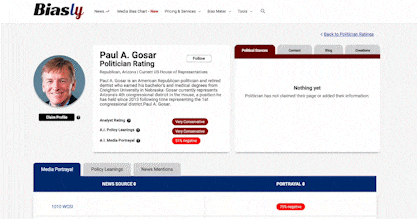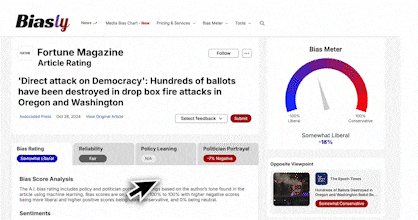 New York Magazine Article Rating
New York Magazine Article RatingFour Good Reasons Democrats Fear the 2024 Election
- Bias Rating
10% Center
- Reliability
70% ReliableGood
- Policy Leaning
10% Center
- Politician Portrayal
-19% Negative
Continue For Free
Create your free account to see the in-depth bias analytics and more.
Continue
Continue
By creating an account, you agree to our Terms and Privacy Policy, and subscribe to email updates. Already a member: Log inBias Score Analysis
The A.I. bias rating includes policy and politician portrayal leanings based on the author’s tone found in the article using machine learning. Bias scores are on a scale of -100% to 100% with higher negative scores being more liberal and higher positive scores being more conservative, and 0% being neutral.
Sentiments
-36% Negative
- Liberal
- Conservative
| Sentence | Sentiment | Bias |
|---|---|---|
Unlock this feature by upgrading to the Pro plan. | ||
Reliability Score Analysis
Policy Leaning Analysis
Politician Portrayal Analysis
Bias Meter
Extremely
Liberal
Very
Liberal
Moderately
Liberal
Somewhat Liberal
Center
Somewhat Conservative
Moderately
Conservative
Very
Conservative
Extremely
Conservative
-100%
Liberal
100%
Conservative

Contributing sentiments towards policy:
59% : If Trump wins, however, he will have a better-than-even chance at a governing trifecta.42% : To be clear, the national polls weren't far off in 2016; the problem was that sparse public polling of key states didn't alert Democrats to the possibility Trump might pull an Electoral College inside straight by winning three states that hadn't gone Republican in many years (since 1984 in Wisconsin, and since 1988 in Michigan and Pennsylvania).
42% : But best we can tell, the Trump voting base is a more-or-less equally divided coalition of people who actually believe some if not all of what their candidate says about the consequences of defeat, and people who just think Trump offers better economic and tougher immigration policies.
35% : While the election may be an existential crisis for Trump himself, since his own personal liberty could depend on the outcome, there's not much evidence that all-or-nothing attitude is shared beyond the MAGA core of his coalition.
35% : Trump has been working hard to perfect the flaws in his 2020 post-election campaign that led to the failed January 6 insurrection, devoting a lot of resources to pre-election litigation and the compilation of post-election fraud allegations.
34% : No lead in the polls looks safe because in previous elections involving Trump, they weren't.
33% : An important psychological factor feeding Democratic fears of a close election is the unavoidable fact that Trump has virtually promised to repeat or even surpass his 2020 effort to overturn the results if he loses.
30% : By contrast, Democrats don't have to exercise a lurid sense of imagination to feel fear about Trump 2.0.
26% : They have Trump 1.0 as a precedent, with the added consideration that the disorganization and poor planning that curbed many of the 45th president's authoritarian tendencies will almost certainly be reduced in 2025.
15% : In both cases, it was Trump who benefitted from polling errors.
*Our bias meter rating uses data science including sentiment analysis, machine learning and our proprietary algorithm for determining biases in news articles. Bias scores are on a scale of -100% to 100% with higher negative scores being more liberal and higher positive scores being more conservative, and 0% being neutral. The rating is an independent analysis and is not affiliated nor sponsored by the news source or any other organization.


























